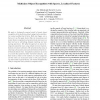Free Online Productivity Tools
i2Speak
i2Symbol
i2OCR
iTex2Img
iWeb2Print
iWeb2Shot
i2Type
iPdf2Split
iPdf2Merge
i2Bopomofo
i2Arabic
i2Style
i2Image
i2PDF
iLatex2Rtf
Sci2ools
109
click to vote
CVPR
2006
IEEE
2006
IEEE
Multiclass Object Recognition with Sparse, Localized Features
We apply a biologically inspired model of visual object recognition to the multiclass object categorization problem. Our model modifies that of Serre, Wolf, and Poggio. As in that work, we first apply Gabor filters at all positions and scales; feature complexity and position/scale invariance are then built up by alternating template matching and max pooling operations. We refine the approach in several biologically plausible ways, using simple versions of sparsification and lateral inhibition. We demonstrate the value of retaining some position and scale information above the intermediate feature level. Using feature selection we arrive at a model that performs better with fewer features. Our final model is tested on the Caltech 101 object categories and the UIUC car localization task, in both cases achieving state-of-the-art performance. The results strengthen the case for using this class of model in computer vision.
Caltech 101 Object | Computer Vision | CVPR 2006 | Final Model | Intermediate Feature Level | Multiclass Object Categorization | Visual Object Recognition |
Related Content
| Added | 12 Oct 2009 |
| Updated | 12 Oct 2009 |
| Type | Conference |
| Year | 2006 |
| Where | CVPR |
| Authors | Jim Mutch, David G. Lowe |
Comments (0)

